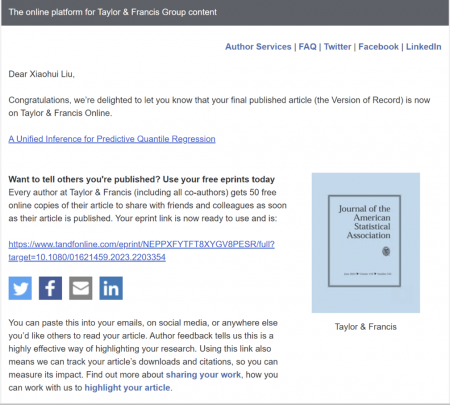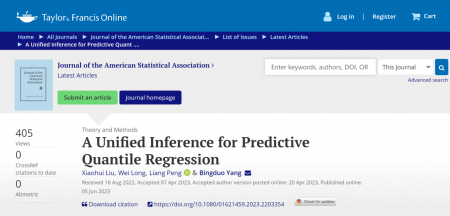编辑:时间:2023-07-20 14:18:32 浏览次数:

Recently, Prof. Xiaohui Liu from the School of Statistics and Data Science of our university, together with her collaborators Prof. Wei Long, Prof. Binduo Yang and Prof. Liang Peng, published a research paper named A Unified Inference for Predictive Quantile Regression in the Journal of the American Statistical Association, the top international journal of statistics. The School of Statistics and Data Science and the Key Laboratory of Data Science for Finance and Economics of the University are the first joint units.
The paper proposes a new type of Unified Inference for Predictive Quantile Regression based on data partitioning technique and stochastic weighted self-help method, which does not need to know whether there is an intercept term in the model and is applicable to predictor variables with different persistence, and conducts a wide range of comparisons with similar existing methods based on Monte Carlo stochastic simulation and real data analysis. Based on Monte Carlo stochastic simulation and real data analysis, the proposed method is widely compared with similar existing methods, and the superiority of the proposed method in terms of performance in limited samples is verified.

For more details, please refer to the original article.
Abstract:
The asymptotic behavior of quantile regression inference becomes dramatically different when it involves a persistent predictor with zero or nonzero intercept. Distinguishing various properties of a predictor is empirically challenging. In this article, we develop a unified predictability test for quantile regression regardless of the presence of intercept and persistence of a predictor. The developed test is a novel combination of data splitting, weighted inference, and a random weighted bootstrap method. Monte Carlo simulations show that the new approach displays significantly better size and power performance than other competing methods in various scenarios, particularly when the predictive regressor contains a nonzero intercept. In an empirical application, we revisit the quantile predictability of the monthly S&P 500 returns between 1980 and 2019. Supplementary materials for this article are available online.
(By Wan Xinyue, Xie Yuxin, Lin Yang, Tao Chunhai, Zhang Mengyun)
